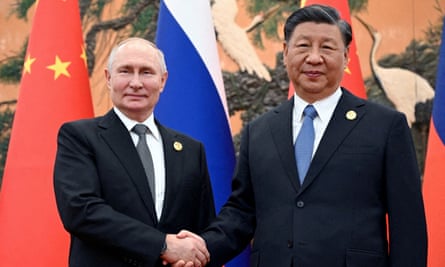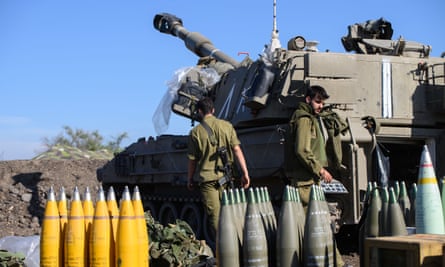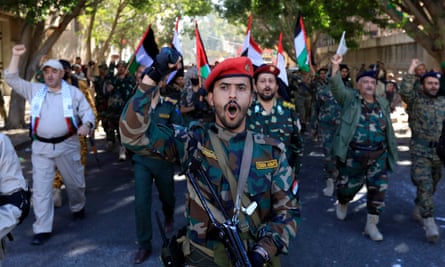Early last Thursday morning, the USS Carney, a US Navy guided missile destroyer, was in the northern Red Sea when its radar detected three cruise missiles apparently launched by Iran-backed Houthi rebels in Yemen. The missiles’ target was unclear but they were heading north, so it was “potentially” Israel. Within a very short time, the Carney had destroyed them all.
These were the first shots fired by the US in defence of Israel in the current conflict. The Pentagon press secretary, Brig Gen Pat Ryder, later told reporters the intervention was “to send a strong message intended to deter a wider conflict” and “regional escalation”.
The crew of the USS Carney are not alone in having this objective. Since terrorist attacks by Hamas killed 1,400 Israelis two weeks ago and prompted retaliation that has so far led to the deaths of at least 4,385 Palestinians in Gaza, according to local authorities, very large numbers of people have been working very hard to contain the hostilities. The motives and means of presidents, prime ministers, priests, humanitarians, protesters, influencers, spies, diplomats and many others may vary but foremost for many is the very real fear of the consequences for all of us of failure.
One scenario runs like this: Israel launches a ground offensive into Gaza that causes the current civilian death toll there to double, or worse. Tensions across the Middle East reach a new white-hot level, spilling over into countries far beyond the region. Israel ignores widespread outrage as the humanitarian situation deteriorates further and fights on until Hamas, sustaining heavy losses, is reduced to a broken rabble.
Hardliners in Iran decide they should intervene, so they tell their most powerful proxy force, Hezbollah, to launch a full-scale offensive from its strongholds in southern Lebanon. Thousands of rockets hit key targets in Israel, putting vital infrastructure out of action and inflicting heavy casualties, while Hezbollah ground forces mass.
Then things escalate regionally, as Ryder might put it. The threat to Israel now looks existential.
In the eastern Mediterranean, two recently arrived US carriers launch strikes on Hezbollah forces and bases, rolling back its offensive but triggering attacks elsewhere and a new wave of huge protests that regimes in the region struggle to contain. Israel threatens direct strikes on Iran.
Now we are at global levels of escalation. Oil prices hit astronomic levels. Stock markets crash. Terrorism return to the capitals of Europe as groups such as Isis and al-Qaida seek to exploit disorder and polarisation. Suddenly, a world battered and polarised by successive crises is facing perhaps its greatest crisis for decades.
No wonder de-escalation is the current catchword of this conflict. That this implies only a relative reduction in violence, at least initially, is a grim reminder of how far we have come in a very short time.

The efforts at de-escalation have been many and varied. The most obvious have been high-level visits to Israel from US, UK and German leaders. Despite the forthright expressions of support, these have nonetheless been aimed at reducing violence.
The diplomatic strategy of these allies has been to keep any criticism of Israel very private, and couch it in the mildest of tones even then. The argument for this is that the Israelis may possibly, maybe, perhaps, listen to someone whom they see as a friend. They will not even hear anyone who might be perceived as lacking understanding in this, their hour of grief and fear. A tight embrace may also restrain, the officials point out.
“I understand. Many Americans understand,” Biden told Israelis as he ended his short stay in Tel Aviv on Wednesday, “You can’t look at what has happened here … and not scream out for justice … But I caution this: while you feel that rage, don’t be consumed by it … After 9/11, we were enraged in the United States. And while we sought justice and got justice, we also made mistakes.”
Biden landed in Israel just as hundreds of millions of people were hearing the first hasty reports of last Tuesday’s explosion at a hospital in northern Gaza, in the zone which Israel has ordered evacuated. Between 100, the lowest figure estimated by US intelligence agencies, and 471, the total given by health authorities in the Hamas-ruled enclave, died.
The blast, which Hamas says was caused by an Israeli airstrike, derailed a key part of Biden’s tour. Meetings with King Abdullah of Jordan and Mahmoud Abbas, the Palestinian president, were abruptly cancelled. “The Palestinian people are suffering greatly as well, and we mourn the loss of innocent Palestinian lives like the entire world” Biden said in Israel.
Biden told reporters that the explosion had been caused by “an errant rocket fired by a terrorist group in Gaza”, backing the version given by Israel and his own intelligence services, as well as that suggested as most probable by weapons experts consulted by the Guardian.
In such an intensely polarised environment, any calls for cautious and impartial appraisal of evidence stood little chance. Newspapers and other media moved quickly to reflect the new doubt, but online, the storms of anger provoked both by the deaths at the hospital and at the various accusations of responsibility, raged unchecked. No one was able to de-escalate the world’s social media feeds. No one even tried.
Other countries are not so much angry as avid to exploit the discomfiture of the US or the chaos in the region or both. Both China and Russia have hardened their positions towards Israel as its military operation in Gaza has continued, and the war underscores the growing gulf between the two cold war allies and western powers.

Both are keen to blame the US for the conflict. The Russian ambassador to the UN has said the US bears “responsibility for the looming war in the Middle East” while the Global Times, a state-run Chinese newspaper, told readers on X, the platform formerly known as Twitter, that “if any group stands any chance to exploit the conflict and profit from the violence, it will probably be the US military-industrial complex.” The claim was illustrated by a gruesome cartoon portrayed a grim-faced Uncle Sam sitting on a throne made of rockets, his feet resting on a vast stars and stripes flag covering several corpses.
Of course, many have spoken of “de-escalation”. Turkey said it is ready to “de-escalate the Israeli-Palestinian conflict”, and the Saudi Arabian foreign minister talked to Antony Blinken, the US secretary of state, about the “need to find a way to quickly de-escalate the situation, to quickly bring back peace, at least stopping the guns, and then working towards addressing also the humanitarian challenges.”
Blinken has not called for “de-escalation” however. Leaked State Department memos show that he has told US diplomats not to use the phrases “de-escalation/ceasefire,” “end to violence/bloodshed” and “restoring calm” as the words do not fit current US policy, the Washington Post reported.
There is some good news. After negotiations brokered by Qatar, two of the 203 hostages taken by Hamas on 7 October – an American mother and daughter – have been released. The plight of the captives, on top of the casualties inflicted in the terrorist raid into Israel, has compounded Israelis’ anger, fear and grief. Reuters cited a source familiar with the negotiations as saying the release of Judith and Natalie Raanan was “a first step and discussions are ongoing for more releases”.
For Mirjana Spoljaric, president of the International Committee of the Red Cross, the move offered a rare “sliver of hope”.
Analysts have stressed that liberating the hostages in Gaza – who include grandmothers, young children, teenagers and one-time peace activists as well as a handful of soldiers – will be almost impossible by purely military means.

Netanyahu said on Friday that Israel “will not relent in our effort to return all of the kidnapped and the missing”, and this pledge alone may make Israeli decision-makers pause before ordering a ground offensive that would make retrieving the hostages alive very much harder.
In other statements in recent days, senior political and defence figures have suggested alternatives to a massive assault – such as special forces raids and a prolonged air campaign. A tiny window permitting de-escalation may just be open.
There is also some hope that the rockets fired by Hezbollah are threats that hide a genuine reluctance to go to war, given the potential consequences for all involved. Analysts say Hezbollah would be very happy with a short conflict that would rally supporters and hide the organisation’s multiple failings, but fear the consequences of a longer battle with Israel.
Historically, Iran has sought to avoid any direct involvement in wars, and may not want to risk the enormous investment made over decades in building up the groups that comprise its “axis of resistance”. Already, one of these – Hamas – is likely to be enormously weakened, if not entirely destroyed, in this current conflict. The loss, too, of Iran’s most powerful remaining such asset would be a grave setback to Tehran’s ambitions.
In much the same way, talk of a global south aligning against the global north, with Israel the polarising fulcrum as it was during the cold war, is over-simplified.
Yes, there are multiple accusations of double standards directed at the US-led west and genuine anger in many parts of the developing world. But then there are elsewhere too.

A statement from the African Union on the current conflict was balanced, however partisan the position of some member states might have been. India is treading a careful path, trying to reconcile its long-held positions on countering terrorism with its recent hopes to build bridges to the Islamic world as a way of outflanking its old enemy Pakistan.
Other influential nations, too, are trying to avoid taking sides, either in the conflict or in the geopolitical rivalries that surround it.
That both Russia and China have links to Iran at least means there are channels of communication open with Tehran, even if they are not ones that Washington or London can shout down. Like with other states in the region, the Iranian leadership may listen to friends, but will barely hear enemies.
And, on Saturday yesterday morning, 20 aid trucks finally crossed from Egypt into Gaza. Though it has been described as a “drop in the ocean” compared with the needs of a humanitarian disaster for 2.3 million people that has already reached “catastrophic levels”, according to the UN, some aid officials appeared optimistic that this would mark the start of a “sustainable effort to provide essential supplies” safely and without impediment.
Also on Saturday yesterday, world leaders and international government representatives attended a peace summit in Cairo that brought together dozens of regional leaders. Hastily arranged, it aimed to produce a roadmap for humanitarian relief and to revive hopes of Israeli-Palestinian peace.
Expectations were low, not least because there was no Israeli delegation and no senior official from the Biden administration, and officials warned that even a joint statement might not possible given the divergence of views.
But at least it was happening. According to Egypt’s state-run media, its immediate aim is de-escalation.
"Stop" - Google News
October 23, 2023 at 01:44AM
https://ift.tt/eJk942W
The week the world tried to stop Gaza spinning out of control - The Guardian
"Stop" - Google News
https://ift.tt/rIHTFvb
https://ift.tt/xlVmoKF
Bagikan Berita Ini














0 Response to "The week the world tried to stop Gaza spinning out of control - The Guardian"
Post a Comment